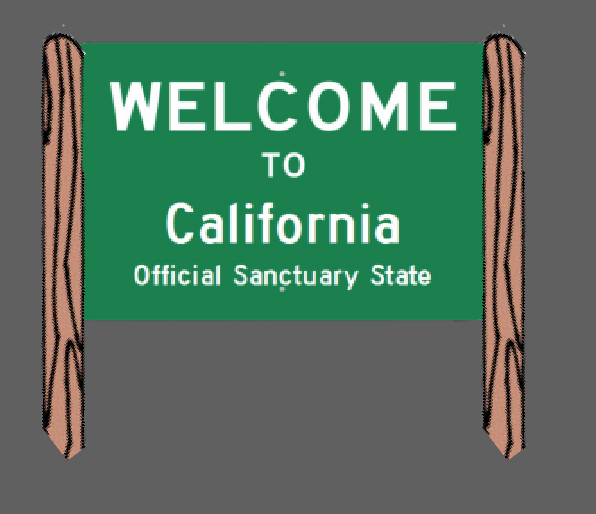The ethics of Immigration and Customs Enforcement arrests
April 1, 2018
The world turned upside down when a new era of polarization stumbled through not the doors of the White House, not the doors of American citizens, but the doors of the world. When will this back and forth quarrel be over? When will we pause to think of the people?
On Oct. 5, 2017, Governor Jerry Brown signed the Senate Bill 54, or California Values Act, proclaiming California as a sanctuary state, preventing local and state agencies to release information on criminals or suspects to federal officers unless they have committed a serious crime.
On Feb. 24, 2018, Oakland mayor Libby Schaaf warned of a large-scale U.S. Immigration and Customs Enforcement (ICE) operation on undocumented immigrants. ICE operations consists of detaining any individual who break U.S. immigration laws. They prioritize people who pose national security threats and who re-enter illegally after deportation. A day later, her warning proved true as hundreds of people were detained by ICE agents. ICE director Thomas Homan declared that she jeopardized their agents’ safety, comparing the arrests to gang operations.
ICE states that they arrested 20,201 people in California in 2017, with 81% carrying a criminal record. Therein lies the question: was mayor Schaaf justified in her actions? Did the warning prevent criminal arrests and endanger public safety?
Aside from a rollercoaster ride, full of bumps and sharp-turns, involving politicians and ICE agents, it is important to remember the undocumented immigrants themselves. They are families who have come to America to search for better opportunities for their children, escape life-threatening dangers in their home countries, or both. They are the brave who have entered a foreign society full of strangers and unfamiliarity.
It’s easy to think about the safety of our community, our friends, our family. As humans, we of course strive to eliminate the risk of harm to our loved ones. After all, our families support us in our ups and downs. The arrests of the convicted 81% of undocumented immigrants may decrease the risk of danger. But what about all the other immigrants? What about their own safety?
On Mar. 6, the Justice Department under Attorney General Jeff Sessions sued California, Governor Jerry Brown, and California’s Attorney General Xavier Barrera over three laws that limit federal immigration agencies in acquiring information of undocumented immigrants.
On Mar. 13, Trump assessed eight prototypes for his U.S.-Mexico border wall in San Diego and criticized Governor Jerry Brown’s governing of California. “You have ‘sanctuary cities’ where you have criminals living in the sanctuary cities,” he said.
Certain undocumented immigrants fled their country due to violence, natural disasters, economic or political instability, or diseases. By deporting the individuals, there is the chance of their facing their former difficulties again.
It’s time to show empathy to the young and old who are living with the anxiety of unexpected deportation and the fear of threats to their lives at home; neither America nor their home countries foster an atmosphere of stability. Most of us have never and likely will never experience the hardships of the undocumented immigrants. It’s time to lend not only a voice, but a heart to them. To the 19% of non-criminal immigrants and to the number of non-national-security-threatening individuals, ICE agents should consider the factors of their safety before hasty detention or deportation. And for us, as a community, we need to provide as much stability and sympathy for them as we can. It’s time for them, and not for us. It’s time to be selfless.
This piece was originally published in the pages of the Winged Post on March 29, 2018.




![LALC Vice President of External Affairs Raeanne Li (11) explains the International Phonetic Alphabet to attendees. "We decided to have more fun topics this year instead of just talking about the same things every year so our older members can also [enjoy],” Raeanne said.](https://harkeraquila.com/wp-content/uploads/2025/10/DSC_4627-1200x795.jpg)


















![“[Building nerf blasters] became this outlet of creativity for me that hasn't been matched by anything else. The process [of] making a build complete to your desire is such a painstakingly difficult process, but I've had to learn from [the skills needed from] soldering to proper painting. There's so many different options for everything, if you think about it, it exists. The best part is [that] if it doesn't exist, you can build it yourself," Ishaan Parate said.](https://harkeraquila.com/wp-content/uploads/2022/08/DSC_8149-900x604.jpg)




![“When I came into high school, I was ready to be a follower. But DECA was a game changer for me. It helped me overcome my fear of public speaking, and it's played such a major role in who I've become today. To be able to successfully lead a chapter of 150 students, an officer team and be one of the upperclassmen I once really admired is something I'm [really] proud of,” Anvitha Tummala ('21) said.](https://harkeraquila.com/wp-content/uploads/2021/07/Screen-Shot-2021-07-25-at-9.50.05-AM-900x594.png)







![“I think getting up in the morning and having a sense of purpose [is exciting]. I think without a certain amount of drive, life is kind of obsolete and mundane, and I think having that every single day is what makes each day unique and kind of makes life exciting,” Neymika Jain (12) said.](https://harkeraquila.com/wp-content/uploads/2017/06/Screen-Shot-2017-06-03-at-4.54.16-PM.png)








![“My slogan is ‘slow feet, don’t eat, and I’m hungry.’ You need to run fast to get where you are–you aren't going to get those championships if you aren't fast,” Angel Cervantes (12) said. “I want to do well in school on my tests and in track and win championships for my team. I live by that, [and] I can do that anywhere: in the classroom or on the field.”](https://harkeraquila.com/wp-content/uploads/2018/06/DSC5146-900x601.jpg)
![“[Volleyball has] taught me how to fall correctly, and another thing it taught is that you don’t have to be the best at something to be good at it. If you just hit the ball in a smart way, then it still scores points and you’re good at it. You could be a background player and still make a much bigger impact on the team than you would think,” Anya Gert (’20) said.](https://harkeraquila.com/wp-content/uploads/2020/06/AnnaGert_JinTuan_HoHPhotoEdited-600x900.jpeg)

![“I'm not nearly there yet, but [my confidence has] definitely been getting better since I was pretty shy and timid coming into Harker my freshman year. I know that there's a lot of people that are really confident in what they do, and I really admire them. Everyone's so driven and that has really pushed me to kind of try to find my own place in high school and be more confident,” Alyssa Huang (’20) said.](https://harkeraquila.com/wp-content/uploads/2020/06/AlyssaHuang_EmilyChen_HoHPhoto-900x749.jpeg)












